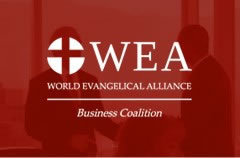BY DR. MICHAEL SCHLUTER AND TIMO PUTSCHINSKI
WEA Business & Ministry News
The following points were areas of discussion at the Congress of Christian Leaders and part of a newly released discussion paper. They were then emailed to the wider body of the WEA to provide feedback so that they can develop these points further.
For more information on the WEA Business Coalition, visit their website
Have evangelical business leaders internalised the mindset of contemporary Capitalism?
1Live too fast. More is more. We are always busy (even if “it is for the Lord”). To be a workaholic is not judged a sin.
BUT time is the currency of relationship, and Christians believe in a relational God. God made the 7th day as a day of rest, to protect families and low-income workers (Ex. 20:8-11, Deut. 5:12-15); he commanded that the land should rest every 7th year (Lev. 25:1-7); and he arranged rest for every 50th year too (Lev. 25:8-13). These commands are shadows of what is to come (Colossians 1:16). Christians should honour the Lord by expressing the principle of rest in ways appropriate to their situation, and in accordance with their own conscience (Romans 14:5), always showing particular care for the marginalised in society.
2Accept debts as a normal part of buying a house, buying cars and running a company. And why not? To enjoy life, and to be part of a market-based consumer culture is not wrong.
BUT doesn’t the Bible say that we should not owe anybody anything (Rom. 13:7)? Isn’t debt a picture of sin and thus something to be avoided (Matt. 6:12)? Isn’t the relationship between a lender and a borrower toxic – the borrower is the slave of the lender (Prov. 22:7)?
3Build up savings through pension funds over which we have little knowledge and no control. Everybody else does the same so it must be alright. After all, we don’t have time to track every investment we make and it is important to spread the risk.
BUT doesn’t Jesus teach that to take a return without responsibility is the same as reaping where we haven’t sown, and the sign of a ‘hard’, or ‘disengaged’, person (Matt. 25:26-27)? Supposing our pension fund money is put into a company in the porn or betting industries? Can we justify letting our money be used in this way on the basis that we did not know that this was happening? Is ignorance an adequate excuse?
4Seek job promotion even when it means moving town or city, and uprooting spouse and children, so we can say we have used our talents well.
BUT doesn’t the bible also teach the importance of long-term, committed relationships which involve a commitment to church, neighbours and community? Is it possible to honor our parents adequately if we move so that we live nowhere near them any more?
5Trust in insurance policies and government provision to look after our elderly parents.
BUT doesn’t the bible teach that we should honor our mother and father, which includes financial provision (Mk. 7:9-13)? And doesn’t Paul also say that those who fail to provide for their immediate relatives have denied the faith and are worse than unbelievers? (1 Tim. 5:8).
6Believe that, because companies have limited liability, companies should be allowed to leave debts unpaid to staff, suppliers and other creditors if they go bankrupt. Wasn’t this part of the implicit contract when employees took those jobs and suppliers provided those goods? As when Enron went bankrupt, shouldn’t shareholders be allowed to be paid out something even when employees are left unpaid and are losing their pensions? They should have known that limited companies don’t pay those debts if they go bankrupt.
BUT doesn’t the Bible say “the wicked borrow and do not repay” (Ps. 37:21) and “The wages you failed to pay the workers … are crying out against you” (Jam. 5:4)?
7Accept pay differentials between the highest and lowest paid employees in a company of 500 to 1 so that an employee has to work 500 years to earn the pay of their boss. Surely this is a reflection of the labor market where wages are set through supply and demand. The invisible hand of the market ensures that justice is done.
BUT didn’t God create all people equal before him? Do such wage differentials deny in any sense the underlying equality in the value of every person? While it is difficult to draw the line in any particular place, doesn’t the constraint on wealth differentials in biblical Israel, e.g. through the ban on interest (Deut. 23:19-20) and the system of land distribution (Josh. 18:8-10), and the Jubilee provision (Lev. 5:8-13) suggest God’s concern that wealth differentials do not get too extreme?
8Look first and foremost for the financial benefit of an investment. Isn’t it right to make as much money as possible from the capital we have so that we can use the surplus we make for the work of God’s kingdom?
BUT didn’t God create all people equal before him? Do such wage differentials deny in any sense the underlying equality in the value of every person? While it is difficult to draw the line in any particular place, doesn’t the constraint on wealth differentials in biblical Israel, e.g. through the ban on interest (Deut. 23:19-20) and the system of land distribution (Josh. 18:8-10), and the Jubilee provision (Lev. 5:8-13) suggest God’s concern that wealth differentials do not get too extreme?
9Avoid paying tax by using every possible legal loophole because as Christians we are able to use our money more effectively to help other people than the government does. Surely Christians have no obligation to pay more tax than the law requires them to.
BUT doesn’t Jesus teach that his followers should pay to Caesar what is due to Caesar (Matt. 22:21)? Doesn’t he also teach that it is the intention of the law rather than the letter of the law that matters in God’s sight (Mk. 3:1-6)? Doesn’t Paul also say “if you owe taxes, pay taxes” (Rom. 13:7)?
10Believe that the purpose of a company should be defined entirely in terms of financial returns to shareholders because they have provided the capital which enables the company to operate. Maximizing returns to capital ensures long-term growth and thus future job opportunities for the unemployed.
BUT is there anywhere in the Bible where owners of capital (or land) are given such privileged status? Doesn’t the command to love our neighbor translate into active involvement and consideration of other stakeholders who are key to a company’s success – such as customers, suppliers and employees? If shareholders are to be the ultimate beneficiaries, should they not be held responsible for the decisions a company makes? Is it right to have a system of absentee owners, who get reward without responsibility?
The American Revolutionaries back in the 18th century had a slogan in their fight against Britain: “No taxation without representation”. A Christian maxim for business life today might be summed up in a new slogan:
No reward without responsibility
No investment without involvement
No profit without participation.
The Authors…
Dr Michael Schluter (UK) worked in his family business before becoming an advisor at the World Bank in East Africa. Since 1982, he has founded his own non-profit organisations for example, the Jubilee Centre which aims to strengthen biblical principles in society. He is the founder and leader of a campaign that is committed to the preservation of Sunday as a day of rest and he has led several major international peace initiatives. Schluter is the author of several books e.g. ”After Capitalism – Rethinking Economic Relationships” and he is a world-renowned speaker
Timo Plutschinski (Germany) is an evangelical theologian, strategic business consultant and a passionate networker. He is leading the Business Coalition of the World Evangelical Alliance (WEA) and belongs to the wider WEA Leadership. While pastoring a local Baptist Church in Hamburg Timo is eager to (re-)define the relationship between business and church and the relevance of Christians in today´s postmodern society. In further functions Timo is also Board Member of the Congress of Christian Leaders, Partner of MIC Corporate Finance and Fellow of the Olivet Institute for Global Strategic Studies.









0 Comments